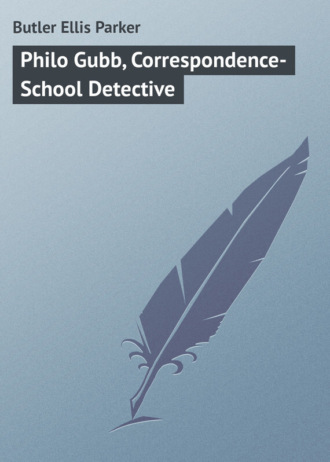
Butler Ellis Parker
Philo Gubb, Correspondence-School Detective
THE DRAGON’S EYE
It was with great pleasure that Mr. Gubb carried four hundred and ninety dollars to Mr. Medderbrook, and his intended father-in-law received him quite graciously.
“This is more like it, Gubb,” he said. “Keep the money coming right along and you’ll find I’m a good friend and a faithful one.”
“I aim so to do to the best of my ability,” said Mr. Gubb, delighted to find Mr. Medderbrook in a good humor. “I hope to get the eleven thousand two hundred and sixty dollars I owe you paid up – ”
“Where do you get that?” asked Mr. Medderbrook. “You owe me twelve thousand dollars, Gubb.”
“It was eleven thousand seven hundred and fifty,” said Mr. Gubb, “and this here payment of four hundred and ninety – ”
“Ah!” said Mr. Medderbrook, “but the Utterly Hopeless Gold-Mine has declared a dividend – ”
“But,” ventured Mr. Gubb timidly, “I thought dividends was money that came to the owner of the stock.”
“Often so,” said Mr. Medderbrook. “I may say, not infrequently so. But in this case it was a compound ten per cent reversible dividend, cumulative and retroactive, payable to prior owners of the stock, on account of the second mortgage debenture lien. In such a case,” he explained, “unless the priority is waived by the party of the first part, you have to pay it to me.”
“Oh!” said Mr. Gubb.
“Luckily,” said Mr. Medderbrook, “I was able to prevail upon the registrar of the company to make the dividend only ten cumulative per cents instead of eleven retroactive geometrical per cents, or you would now owe me thirteen thousand dollars.”
“Well, I’m sure I’m much obliged to you,” said Mr. Gubb with sincere gratitude. “I appreciate your kindness of good-will most greatly.”
He stood for a minute or two uneasily, while Mr. Medderbrook frowned like a great financier burdened with cares.
“I don’t suppose,” said Mr. Gubb, when he had screwed up his courage, “you have had no telegraphic communications from Miss Syrilla?”
“Why, yes, I have,” said Mr. Medderbrook, taking a telegram from his pocket, “and it will only cost you one dollar to read it. I paid two dollars.”
Mr. Gubb was very glad to pay the small sum and he eagerly devoured the telegram, which read: —
Oh be joyful! Have given up all meat diet. Have given up beef, pork, lamb, mutton, veal, chicken, pigs’ feet, bacon, hash, corned beef, venison, bear steak, frogs’ legs, opossum, and fried snails. Weigh only nine hundred and forty pounds. Affectionate thoughts to little Gubby.
“I wish,” said Mr. Gubb wistfully, when he had read the message, “that Miss Syrilla could be here present this week in Riverbank whilst the Carnival is going on.”
“She would draw a big crowd at twenty-five cents admission,” said Mr. Medderbrook.
“I was thinking how pleasantly nice it would be for her to enjoy the festivities of the occasion,” said Mr. Gubb, but this was not quite true. What he wished was that she could be present to see him in the handsome disguise he had obtained for his work as Official Detective of the Carnival, and which he was now about to don.
This, the second day of the Third Riverbank Carnival, opened with a sun hot enough to frizzle bacon, and the ladies in charge of the lemonade, ice-cream and ice-cream cone booths were pleased, while the committee from Riverbank Lodge P.& G. M., No. 788, selling broiled frankfurters (known as “hot dogs”), groaned. It was no day for hot food. But it was grand Carnival weather.
The grounds opened at one-thirty and the amateur circus began at two-thirty, but Philo Gubb, the detective, was on the grounds in full regalia by ten o’clock in the morning. Through some awful error on the part of the Chicago costumer, Philo Gubb’s regalia had not arrived in time for the first day of the Carnival, so he had absented himself rather than let the crooks and thieves who were supposed to swarm the grounds have an opportunity to become acquainted with his appearance and thus be put on their guard against the famous Correspondence School detective.
When the Committee on Organization of the Third Carnival and Circus for the benefit of the Riverbank Free Hospital held its first public mass meeting in Willcox Hall, Philo Gubb had been there. Like all the rest of Riverbank, he was willing to assist the good cause in any way he could, and he had meant to donate his services as official paper-hanger, but a grander opportunity offered. Mr. Beech, the Chairman of the Committee on Peanuts and Police Protection, offered Mr. Gubb the position of Official Detective. Mr. Gubb accepted eagerly.
During the weeks of preparation for the Carnival, a thousand plans for getting the better of pickpockets and other crooks passed through Philo Gubb’s mind. He finally decided to disguise himself as Ali Baba. He had a slight recollection that Ali Baba had something to do with forty thieves. It seemed an appropriate alias.
His disguise he ordered from the Supply Department of the Rising Sun Detective Agency, where he bought all his disguises. It consisted of a tall conical cap spangled with stars, a sort of red Mother-Hubbard gown bespattered with black crescents, a small metal tube, and a wand. With the metal tube came several hundred sheets of apparently blank paper, but, when these were rolled into cylinders and inserted in the metal tube for half a minute, characters appeared on the sheets. A child could work the magic tube, and so could Philo Gubb.
It was not until the second day that Mr. Beech thought of Mr. Gubb at all. Then Mrs. Phillipetti, daughter-in-law of General Phillipetti, who was Ambassador to Siberia in 1867, asked for Mr. Gubb. Mrs. Phillipetti was in charge of the Hot Waffles Booth, No. 13, aided by seventeen ladies of the highest society Riverbank could boast, and they served hot waffles with their own fair hands to all who chose to buy. The cooking of the waffles, being a warm task in late June, had been turned over to three colored women, hired for the occasion, and to complete the “ongsomble” and make things perfectly “apropos” – two of Mrs. Phillipetti’s favorite words – the three colored women had been dressed as Turkish slaves, while Mrs. Phillipetti and her aides dressed as Beauties of the Harem.
To judge by Mrs. Phillipetti’s costume, the Beauties of the Harem were expensive to clothe. She had more silk, gold lace, and tinsel strung upon her ample form than would set a theatrical costumer up in business, but the star feature of her costume was her turban. It was a gorgeous creation, and would have been a comfortable piece of headgear in midwinter, although slightly heating for a hot June day, but it came near being the talk of the Carnival, for in the center of the front, just above her forehead, Mrs. Phillipetti had pinned the celebrated brooch containing the Dragon’s Eye – the priceless ruby given to old General Phillipetti by the Dugosh of Zind after the old diplomat had saved the worthless life of the old reprobate by appealing to the Vice-Regent of Siberia in his behalf.
The Dragon’s Eye was about the size of a lemon and weighed nearly as much as a pound of creamery butter, so it required considerable turban to make it “apropos” and complete its “ongsomble.” Pinned on her shelf-like chest, Mrs. Phillipetti wore a small mirror somewhat smaller than a tea saucer. By tipping the outer edge of the mirror upward and glancing down into it, Mrs. Phillipetti had a good view of the entire façade of her turban, reflected in the mirror, and she was thus able to keep an eye on the Dragon’s Eye.
“Oh, Mr. Beech!” cried Mrs. Phillipetti, stopping him as he was bustling past her booth, “do you know where Mr. Gubb is?”
“Gubb? Gubb?” said Mr. Beech. “Oh! that paper-hanger-detective fellow? No, I don’t know where he is. Why?”
“It’s gone! The Dragon’s Eye is gone!” moaned Mrs. Phillipetti.
Mr. Beech, although greatly concerned, tried to maintain his composure. Mrs. Phillipetti explained that she had removed her turban and placed it under a chair at the back of the booth. A little later she had noticed that the turban, with the priceless Dragon’s Eye, was gone.
“Now, this – now – was not wholly unexpected,” Beech said. “It’s a – now – unfortunate thing, but it’s the sort of thing that happens. Now, Mrs. Phillipetti, just let me beg you not to say anything about it to anybody, and I’ll have Detective Gubb get right on the case. The matter is in my hands. Rest easy! We will attend to it.”
“I – I hate to lose the Dragon’s Eye,” said Mrs. Phillipetti, wiping her eyes, “but the worst is to have my turban stolen. Mr. Beech, I will give one hundred dollars to whoever returns the Dragon’s Eye to me. The ‘ongsomble’ of my costume is ruined. I haven’t anything else ‘apropos’ to wear on my head.”
“You look fine just as you are,” said Mr. Beech. “But if you want something to wear, you can get a Turkish hat at the Paper Hat Booth for twenty-five cents.”
“Thank you!” said Mrs. Phillipetti scornfully. “I don’t wear twenty-five-cent hats!”
Within twenty minutes the Boy Scouts, who were acting as Aides to the Executive Committee, had tacked in ten prominent places ten hastily daubed placards that read: —
Philo Gubb, please report at Executive Booth.
Beech, Chmn. Police Committee.
And the members of the Board of Managers had, singly and by roundabout routes, approached the scene of the theft and had studied it.
To the left of Mrs. Phillipetti’s booth was the Ethiopian Dip. Here, some thirty feet back from a counter and shielded by a net, a negro sat on an elevated perch just over a canvas tub full of water. In front of the net was a small target, and if a patron of the game hit the target with a baseball, the negro suddenly and unexpectedly dropped into the tub of water. The price was three throws for five cents.
As Riverbank had some remarkably clever baseball throwers, the Ethiopian was dipped quite frequently. As the water was cold and such a bath an unusual luxury for the Riverbank Ethiopians, no one Ethiopian cared to be dipped very often in succession. Therefore the Committee of Seven of the Exempt Firemen’s Association, which had the Dip in charge, had arranged for a quick change of Ethiopians, and while one sat on the perch to be dipped, three others lolled in bathing costumes just back of Mrs. Phillipetti’s booth.
Mr. Beech questioned the colored men quietly.
“Turbine?” said one of them. “We ain’t seen no turbine. We ain’t seen nuffin’. We ain’t done nuffin’ but sit here an’ play craps.”
“But you were here?” said Mr. Beech.
“Yes, we was heah,” said the blackest negro. “We was right heah all de time. Dey ain’t been no turbine took from nowhar whilst we was heah, neither. Ain’t been nobody back heah but us, an’ we’s been heah all de time.”
“Well, perhaps you can tell how this board got pried loose, if you were here all the time,” said Mr. Beech.
“It wa’n’t pried loose,” said the yellow negro. “Hit got kicked loose f’om de hinside. I know dat much, annerways. I seen dat oc-cur. I seen dat board bulge out an’ bulge out an’ bulge out twell hit bust out. An’ dey hain’t no turbine come out, nuther. No, sah!”
Mr. Beech went away. The detective business was not his business. He specialized in coal and not in crime. But in going he passed by Mrs. Phillipetti’s booth and spoke to her.
“It will be all right,” he said reassuringly. “We are on the track.”
“Oh, thank you!” said Mrs. Phillipetti, who had completed the “apropriety” of her “ongsomble” by wrapping a green silk handkerchief about her head.
“I hope to return the turban and the jewel sometime to-morrow,” said Mr. Beech, bluffing bravely.
But Philo Gubb did not heed the notices posted to call him to the Executive Booth. The evening passed and he did not appear, and Mr. Beech, on his way home, stopped at the police station. It was after midnight, but Chief of Police Wittaker was still on duty. He never slept during the Carnival.
Mr. Beech explained the loss of the turban and the Dragon’s Eye, and early the next morning the Chief himself took up the hunt. By three o’clock in the afternoon he had discovered several things. He discovered that the yellow man who had claimed to see the board pushed out from the inside was the husband of one of the waffle cooks in Mrs. Phillipetti’s booth. He learned that the yellow man had been in jail. He learned that for a few minutes the yellow negro had been alone behind the waffle booth. The Chief thereupon arrested the yellow negro.
As he led the negro from the grounds by the back way, in order to cause as little commotion as possible, he brushed by a strange creature dressed as a wizard, who was standing by the rear entrance, droning: “Tell your fortune, ten cents! Tell your fortune, ten cents!” The wizard was tall and thin and wore a long white beard, a sort of Mother-Hubbard gown, and a pointed cap. As the Chief passed with his prisoner the wizard turned his eyes on the two, and then droned on. It was Philo Gubb, the paper-hanger detective, on the job!
Philo Gubb, having received his costume, had come to the Carnival grounds the back way. He had wandered about the grounds, peeking and peering, seeking malefactors unsuccessfully. He felt the whole weight of the Carnival on his shoulders. When he suspected a youth he followed him at a safe distance, stopping when he stopped, going on when he went on. He was so intent on trailing and shadowing that he did not even notice the placards calling him to the Executive Booth. Every few minutes he had to stop and tell a fortune with the magic tube. So far he had collected two dollars and sixty cents.
The Chief, with his prisoner walking quietly by his side, – to avoid unpleasant commotion in an otherwise orderly crowd, – had just passed the wizard when he heard voices that made him look back.
“There he is!” said one voice. “Kick him off the grounds!”
“Here, you!” said another voice. “You’ve got to get out of here. And you’ve got to give up the money you’ve taken. Quick now. We don’t allow any professionals on these grounds.”
The voices were those of Henry P. Cross, Officer of the Day for this day of the Carnival, and Sam Green, Jr., Vice-Chairman of Police, and they were speaking to the wizard.
“Sh!” said the wizard, in a mysterious voice. “It’s all right! Don’t make a fuss. It’s all right!”
“Let me kick him off the grounds!” said Mr. Cross. “All I want is a chance to kick him off the grounds. The cheap professional fakir, sneaking in to get money that ought to go to the Hospital! Let me kick – ”
“Now, wait!” said Mr. Green irritably. “We want to make him disgorge first, don’t we? Just keep your head on, Cross. Let me handle this.”
“It’s all right! Don’t make a fuss,” whispered the wizard. “I belong here.”
“You belong nowhere!” shouted Mr. Cross. “You belong here, indeed! Why, you couldn’t tell that to a baby! I guess not! Telling fortunes and putting the cash in your pocket. Don’t the Ladies’ Aid of the Second Baptist Church have the exclusive fortune-telling privilege? Didn’t they put us onto you?”
The Chief turned back.
“What’s up?” he asked.
“Professional,” said Mr. Green. “Some Chicago grafter trying to make money out of our show.”
“I’m all right, I tell you,” said Philo Gubb earnestly. “I’m no crook. You see Beech. Ask Beech. Have Beech come here.”
Mr. Cross looked at Mr. Green.
“You mean you fixed it with Beech so you could tell fortunes here?” asked Mr. Cross.
“Yes, that’s what I mean,” said Philo Gubb. “You get Beech.”
“Get Beech,” said Mr. Green. “Beech will throw him out.”
“I’ll watch him,” said the Chief. “If he tries to move I’ll club him.”
Mr. Cross and Mr. Green hurried away, and the Chief dangled his club meaningly. The yellow man, who had been standing awaiting the end of the controversy, seated himself on the grass and leaned his back against a tree. Philo Gubb, as evidence that he did not mean to run, also seated himself, and leaned back against the same tree. The Chief stood a short distance away, his eyes keenly on them.
“How about it, Chicago man?” asked the yellow man in a low tone, bending down to pick a blade of grass. “Kin you he’p a feller out?”
“How?” asked Philo Gubb.
“I got in trouble,” said the yellow man. “I’m gwine git hit in de neck ef some one don’t he’p me mighty quick. Ef I hand you somethin’ is you gwine take it?”
“Sure,” said Philo Gubb.
“Grab it!” whispered the yellow man, and his hand slid the Dragon’s Eye into the hand of Philo Gubb.
The Chief moved nearer.
“I guess dey let me go whin dey git me to de calaboose,” said the yellow man in a louder voice. “Kaze I ain’ done nuffin’ nohow.”
“They’ll let you go when we get that ruby,” said the Chief meaningly; “and if we can prove it on you, you go to the pen’.”
Mr. Cross and Mr. Green returned with Mr. Beech.
“There he is,” said Mr. Cross, pointing to the wizard Gubb.
“Never saw him in my life!” said Mr. Beech. “Now, then, what is this now? What’s this story you – ”
The paper-hanger detective arose and leaned close to Mr. Beech’s ear. He whispered three words and Mr. Beech’s attitude changed entirely.
“Oh!” he said. “I wondered where – now – all right! It’s all right! It’s all right, Cross. All right, Green. All right, Chief!” Then he turned to Gubb. “We’ve been wanting you, detective. Put up placards for you. Now, listen! Mrs. Phillipetti had a turban stolen from her booth, and that infernal ton and a half or so of ruby was in it. The Dragon’s Eye, she calls it. Well, that turban was stolen – ”
“I am quite well acquainted with that fact,” said Philo Gubb.
“Well, why don’t you hunt for it, then?” asked Mr. Beech crossly. “I thought you were going to be of some use. Fooling around here with your silly ten-cent fortune-telling, having the time of your life while all of us are worrying about that Dragon’s Eye. Why don’t you hunt for it?”
“It ain’t hardly necessary to engage in deteckative exertions at the present moment on account of that ruby,” said Philo Gubb slowly, “because when I want it, all I got to do is to consult the magic deteckative tube.”
“You’re crazy!” said Mr. Beech. “You’re crazy as a loon!”
“The usual price for consulting the oracle is ten cents,” said Philo Gubb, “but I’ll make a special exception out of this time.”
He put the end of the magic tube to his ear and listened.
“The genyi of the tube says I’ve got the Dragon’s Eye into my pocket, and if you ask this yellow negro black-man he’ll tell you where the turban is at.”
“Honest!” exclaimed Mr. Beech. “Gubb, you’re a wonder!”
The negro, thus trapped, told where he had hidden the turban, and in a few minutes Mr. Beech, Mr. Cross, and Mr. Green returned with Mrs. Phillipetti, on whose head again towered the turban with the Dragon’s Eye gleaming in it, making her “ongsomble” thoroughly “apropos.”
“Gubb,” said Mr. Beech, “I want Mrs. Phillipetti to meet you. You certainly are a wizard.”
“Yes, indeed!” said Mrs. Phillipetti. “The wizardry of your whole ongsomble is completely apropos to your detective ability.”
THE PROGRESSIVE MURDER
When Philo Gubb paid Mr. Medderbrook the one hundred dollars he had received for retrieving the Dragon’s Eye, Mr. Medderbrook was not extremely gracious.
“I’ll take it on account,” he said grudgingly, “but it ought to be more. It only brings what you owe me for that Utterly Hopeless Gold-Mine stock down to eleven thousand nine hundred dollars and, at this rate, you’ll never get me paid up. I can’t tell when there’ll come along another dividend of ten cumulative per cents on that stock, that I will have to charge up against you. Unless you can do better I have half a mind not to let you see the telegram I got from my daughter Syrilla this morning.”
“Was the news into it good?” asked Mr. Gubb eagerly.
“As good as gold,” said Mr. Medderbrook. “As good as Utterly Hopeless Gold-Mine stock.”
“What did Miss Syrilla convey the remark of?” asked the lovelorn paper-hanger detective.
“Well, now,” said Mr. Medderbrook, “I went and paid two dollars and fifty cents for that telegram. For one dollar and twenty-five cents I’ll give you the telegram, and you can read it from start to finish.”
Mr. Gubb, his heart palpitating as only a lover’s heart can palpitate, paid Mr. Medderbrook the sum he asked and eagerly read the telegram from Syrilla. It said: —
Grand news! Have given up all fish diet. Have given up codfish, weak fish, sole, flounder, shark’s fins, bass, trout, herring (dried, kippered, smoked, and fresh), finnan haddie, perch, pike, pickerel, lobster, halibut, and stewed eels. Gross weight now only nine hundred and thirty pounds averdupois. Sweet thoughts to Gubby-lubby.
“You are touched,” said Mr. Medderbrook as Mr. Gubb put the dear missive to his lips, “but unless I am mistaken you will be still more deeply touched when you pay for – when you read Syrilla’s next telegram.”
“I so hope and trust,” said Mr. Gubb, and he returned to his office in the Opera House Block with a light heart.
With the increase of fame that came to him as a detective Mr. Gubb’s paper-hanging business had grown, and he had left Mrs. Murphy’s house and taken a room on the second floor of Opera House Block, near the offices of ex-Judge Gilroy, attorney-at-law, and C. M. Dillman, loans and real estate. The door now bore the sign
PHILO GUBB
DETECKATIVE
Also Paper-hanging
On this morning Detective Gubb had hardly reached his office when Uncle Gabriel Hostetter, a shrewd smile on his face, opened Mr. Gubb’s door.
Uncle Gabriel Hostetter was a round-shouldered old man with a long white beard that came to a thin point. He wore old-fashioned gold-rimmed spectacles, the rims forming irregular octagons, and on his head he wore one of the grandest old silk hats that ever saw the light of day in 1865. His principal garment was a frock coat, once black, but now grayish green. He was the wealthiest man in town, and it was said that when he once got his hands on a silver dollar he squeezed it so hard that the bird of freedom on it uttered a squawk.
He opened Philo Gubb’s door hesitatingly. He expected to see an array of mahogany desks and filing cabinets for which he would have to pay every time the detective turned around. When he peered into the room he saw a tall, thin man in white overalls with a bib, sitting on an up-ended bundle of wall-paper, stirring a pail of paste with one hand while he ate a ham sandwich by means of the other.
“I guess I got in the wrong place,” said Uncle Gabe. “Thought this was a detective office. All right! All right!”
“I’m him,” said Philo Gubb, swallowing a hunk of sandwich with a gulp and wiping his hand on his overalls.
“You’re who?” asked Uncle Gabe.
“I’m the deteckative,” said Philo Gubb.
“You are, hey?” said Uncle Gabe. “All disguised up, I reckon.”
“Disguised up?” said Philo questioningly. “Oh, this here paper-hanging and decorating stuff? No, this ain’t no disguise. Even a deteckative has got to earn a living while his practice is building up.”
“Humph!” said old Gabe. “Detecting ain’t very good right now?”
“It ain’t, for a fact,” said Philo.
“Well, if that’s so,” said old Gabe, “maybe you and me could do business. If you want to do a little detective work to sort of keep your hand in, maybe we can do business.”
“I ought to git paid something,” said Philo doubtfully.
“Pay!” exclaimed old Gabe. “Pay for bein’ allowed to sharpen up and keep bright? Why, you’d ought to pay me for lettin’ you have the practice. It ain’t goin’ to do me no good, is it?”
“I don’t know what you want me to detect yet,” said Philo. “I might pay some if it was a case that would do me good to practice on. I might pay a little.”
“I knew it,” said old Gabe. “Now, this case of mine – What sort of a case would you pay to work on?”
“Well,” said Philo thoughtfully, “if I was to have a chance at a real tough murder case, for instance.”
“Humph!” said old Gabe. “How much might you pay to be let work on a case like that?”
“Well, I dunno!” said Philo Gubb thoughtfully. “If it looked like a mighty hard case I might pay a dollar a day – if it was a murder case.”
“This case of mine,” said old Gabe, coming farther into the room, “is just that sort of a case. And I’ll let you work on it for a dollar and a quatter a day.”
“Well, if it’s that kind of a case,” said Philo slowly, “I’ll give you a dollar a day, and I’ll work on it hard and faithful.”
“A dollar and a quatter a day,” insisted old Gabe.
“No, sir, a dollar is all I can afford to pay,” said Philo.
“All right, I won’t be mean,” said old Gabe. “Make it a dollar an’ fifteen cents and we’ll call it a go.”
“One dollar a day,” said Philo.
“A dollar, ten cents,” urged old Gabe.
“One dollar,” said Philo.
“Tell you what let’s do,” said old Gabe. “We ain’t but ten cents apart. You add on a nickel and I’ll knock off a nickel, and we’ll make it a dollar five. What say? That’s fair enough. You ain’t come up any. I come all the way down.”
“All right, then,” said Philo. “It’s a go. Now, who was murdered, and when was he murdered, and why was he murdered? Them’s the things I’ve got to know first.”
“You pay me a dollar five for the first day’s work, and I’ll tell you,” said old Gabe.
Philo dug into his pocket and drew out some money. “There,” he said. “There’s two dollars and ten cents. That pays for two days. Now, go ahead.”
He drew out his notebook and wet the end of a pencil and waited.
“The reason this is such a hard case,” said old Gabe slowly, and choosing his words with care, “is because the murder ain’t completed yet. It’s being did.”
“Right now?” exclaimed Philo excitedly. “Why, we oughtn’t to be sitting here like this. We ought – ”
“Now, don’t be in such a hurry,” said old Gabe. “If you mean we ought to be where the victim of the murder is, we are. He’s right here now. I’m him. I’m the one that’s being murdered. I’m being murdered by slow murder. I’m liable to drop down dead any minute. But I don’t want to be murdered and not have the feller that murders me hang like he ought. I can’t be expected to. It ain’t human nature.”
“No, it ain’t,” agreed Philo. “A man can’t help feeling revengeful against the man that murders him. If anybody murdered me I’d feel the same way. How’s he killing you? Slow poison?”
“Gun-shot,” said old Gabe. “Shootin’ me to death with a gun.”
The correspondence school detective looked at old Gabe with amazement.
“Shootin’ you to death with a gun!” he exclaimed. “Ain’t you told the police?”
“I come to you, didn’t I?” asked old Gabe. “If I was to set the police on the feller he might rouse up and shoot me to death all at once.”
“How is he shootin’ you to death?” asked Philo.
“By inches, b’gee,” said old Gabe. “Yes, sir, by inches. Every once in a while he takes a shot at me. Sometimes through the window of my house, and sometimes when I’m walkin’ on the street.”
“And he ain’t ever hit you yet?” asked Philo Gubb.
“Hit me?” exclaimed old Gabe. “Why, he don’t ever miss me. He hits me every time. There ain’t a day he don’t shoot and hit me, and some days he hits me two or three times. I dare say I’m almost dead now, if I knowed it.”
Philo Gubb fondled his notebook uncertainly.
“What – what does he shoot you with?” he asked.
“Well, I dunno exactly,” said old Gabe. “With a pea-shooter.”
Philo Gubb closed his notebook, and slipped it into his pocket.
“If all you was after was to get that two dollars and ten cents, you might have got it without wastin’ so much of my time,” he said reproachfully.
But old Gabe did not move.
“What’s the matter?” he asked.
“Maybe I’m a fool,” Gubb said bitterly, “but I ain’t no such fool as to think anybody is murdering nobody with a pea-shooter.”
“Was you ever shot with a cannon?” asked old Gabe calmly.
“No, nor nobody ever tried to murder me with a pea-shooter,” said Philo Gubb.
“If you ever was shot by a thirteen-inch cannon ball,” said old Gabe, “you’d know it. When a thirteen-inch cannon ball hits you, there ain’t nothin’ left of you at all. But when a one-inch cannon ball hits you, you’ve got a chance to live a minute or two, maybe. That’s the difference between a thirteen-inch cannon ball shootin’ you, and a one-inch cannon ball shootin’ you. And a rifle ball is different, too.”
“I got a job of paper-hangin’ as soon as I can get away from here,” said Philo Gubb meaningly.
“You got a job of detectin’ on hand now,” said old Gabe. “And, as I was sayin’, a rifle ball acts different. Maybe it kills you the first shot, and maybe you can hold three or four rifle bullets before you die, but if they keep on shootin’ at you, you get killed sooner or later. Probably five shots is all any man could stand. I guess that’s about it.
“And then you come down to one of them little twenty-two caliber revolvers. If he don’t hit you in the heart, a murderer could easy enough shoot at you twenty-five times with one of them little twenty-two’s before he killed you dead. But you’d be dead sooner or later. It’s just a matter of what a man shoots you with that makes the difference in time.
“Of course,” he continued agreeably, “you don’t expect no pea-shooter to kill me as quick as a thirteen-inch gun would. If you expect that you’re unreasonable. But the principle is just the same. Shootin’ is shootin’. You know how that pome goes —
‘The constant drip of water
Wears away the hardest stone – ’
and that’s just as true of murderin’ a man with a pea-shooter.
“And the beauty of it is that nobody knows you’re committin’ a murder. If anybody catches you and asks you what you’re doin’ you just say, ‘Oh, nothin’. Just shootin’ peas.’”
“Maybe that’s so,” agreed Philo Gubb. “It sounds reasonable. But the thing for me to do is to wait until you’re dead and then catch the feller. It ain’t a murder until you’re dead.”
“It ain’t, ain’t it?” sneered old Gabe. “You’d wait until I am dead, I suppose, and then start out to catch the feller. And you’d lose all the help I can give you. It ain’t often a detective can get the corpse to help him like this.”
“No, it ain’t,” agreed Philo Gubb.
“I got a suspicion who the feller is,” said Gabe.
“Who?” asked Philo Gubb.
“You’ll go ahead with the case? On the terms we settled on?” asked old Gabe.
Philo Gubb considered this carefully.
“Why, yes,” he said at length, “I will. Who is the feller you think is doin’ it?”







